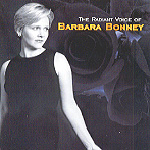This recording reaffirms my conviction that catch-all compilations usually are not a good idea. Whatever the reason for these things (I still wonder who is the intended market), the result neither works from a programmatic standpoint (you’re bounced here and there among styles, performing configurations, venues, and sometimes even developmental periods in the artist’s life), nor does it ideally reflect a performer’s interpretive insights or comprehensive grasp of any particular work. There’s no context and no time for us to gain understanding of the artist’s point of view. That said, Barbara Bonney has a lovely voice (I’ve said this in reviews many times before) and she knows how to use its relatively light but extremely agile qualities to fine effect. She’s accurate in intonation and tasteful in expressive mannerisms. No, the problems here have nothing to do with Bonney’s voice. In fact what you notice as you listen to these 19 selections from her various solo, duet, and opera recordings is how pretty everything is–it’s really a pleasant sound and it’s amazingly consistent across the years that the performances were made, from 1986-1999.
But having all of these things lumped together gives us a chance to hear side by side her strengths and weaknesses–like how her Schumann “Mondnacht” sounds so characterless next to her Mozart arias “Deh, vieni, non tardar” and “Ach, ich fühl’s”; or how her interpretation of Dowland’s “Come again: sweet love doth now invite” sounds so ordinary in comparison to her passionate rendition of Berg’s “Die Nachtigall” (Dowland deserves as much). What should be a subtle and enchanting entrance in Strauss’ “Morgen” is a non-event; but what Bonney does with the ending is marvelous. But what a demented decision to follow this soft, gentle trailing into silence with the heart-stopping, sudden, crashing orchestral blast at the beginning of the same composer’s “Presentation of the Rose” from Der Rosenkavalier! Be warned–you’ll jump right out of your seat. The singing that follows is really fine (once you’ve recovered from shock), and the program concludes with the abovementioned Berg song, a decent “In trutina” from Orff’s Carmina Burana, a bored-sounding “Pie Jesu” from Andrew Lloyd Webber’s Requiem (I’d be bored, too, singing this), and one of the absolute highlights of the disc, André Previn’s Vocalise, with cellist Sato Knudsen and the composer at the piano.
The sound unavoidably varies somewhat (not distractingly so), from the tracks with only piano accompaniment to those with full orchestra, from those taken from opera recordings to those made on a stage or in a church. However, you accept a certain degree of sonic inconsistency on this kind of program; it’s the contextual discrepancies and stylistic confrontations that beg the questions regarding good musical and programmatic sense. If you really want to get to know this outstanding singer, try her Pergolesi disc with countertenor Andreas Scholl, the Berg Sieben frühe Lieder (coupled with Mahler Symphony No. 4), her disc of Nordic songs, or her recording of songs by Copland and Previn–all on Decca.
































